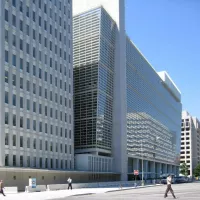Africa is the second-largest and second-most populous continent, comprising 20% of Earth's land area and housing approximately 18% of the world's population (nearly 1.4 billion people as of 2021). It has the youngest population globally. Despite being the least wealthy inhabited continent per capita, Africa's significant natural resources, recent economic growth, and youthful demographic position it as an important economic market. Factors contributing to its lower wealth concentration are attributed to historical and contemporary issues, including colonialism, corruption, and geographical or climatic conditions.
1914: European Control in Africa by 1914
By 1914, nearly 90% of the African continent was under European control, with only a few states retaining sovereignty.
1922: Record for highest ever recorded temperature in Libya in 1922
In 1922, the record for the highest-ever recorded temperature was measured in Libya at 58 °C (136 °F).
1950: Population in Africa
In 1950, the population of Africa was 229 million.
1951: Libya gains independence in 1951
In 1951, Libya, formerly an Italian colony, gained independence.
1955: Start of the First Sudanese Civil War in 1955
In 1955, the First Sudanese Civil War began, fought primarily on ethnic and religious lines.
1956: Start of Apartheid in South Africa in 1956
From 1956, South Africa implemented a system of racial segregation known as apartheid.
March 1957: Ghana gains independence in March 1957
In March 1957, Ghana became the first sub-Saharan colony to be granted independence.
1960: Year of Africa in 1960
1960 is known as the Year of Africa, with waves of decolonisation taking place across the continent.
1963: Establishment of the Organisation of African Unity
In 1963, newly independent African states established the Organisation of African Unity (OAU), which was the predecessor to the African Union.
1965: Rhodesia's Unilateral Declaration of Independence in 1965
In 1965, Rhodesia unilaterally declared independence from the United Kingdom under Ian Smith's white minority government.
1973: Poverty benchmark
In 2003, the average poor person in sub-Saharan Africa was estimated to be poorer than in 1973.
1975: Return of Colonials to Portugal
Between 1975 and 1977, over a million colonials returned to Portugal.
1975: End of Portugal's presence in sub-Saharan Africa in 1975
Portugal's presence in sub-Saharan Africa ended in 1975 after the Estado Novo regime was overthrown in Lisbon.
1977: Return of Colonials to Portugal
Between 1975 and 1977, over a million colonials returned to Portugal.
1980: Zimbabwe gains international recognition in 1980
In 1980, Rhodesia was internationally recognized as an independent state named Zimbabwe, after black nationalists gained power.
1981: Berber origin of the name 'Africa' hypothesis
In 1981, a hypothesis suggested that the name 'Africa' stems from the Berber word 'ifri' (plural 'ifran'), meaning 'cave', in reference to cave dwellers.
1981: Poverty in Sub-Saharan Africa
In 1981, approximately 50% of the population in Sub-Saharan Africa was living in poverty, which amounted to about 200 million people.
1983: Major famine in Ethiopia between 1983 and 1985
Between 1983 and 1985, a major famine occurred in Ethiopia, resulting in up to 1.2 million deaths.
1983: Start of the Second Sudanese Civil War in 1983
In 1983, the Second Sudanese Civil War began, primarily fought on ethnic and religious lines.
1985: Major famine in Ethiopia between 1983 and 1985
Between 1983 and 1985, a major famine occurred in Ethiopia, resulting in up to 1.2 million deaths.
1990: Trend Towards More Democratic Governance from 1990-2018
Between 1990 and 2018, the African continent as a whole trended towards more democratic governance.
1990: Population Growth in Africa
By 1990, the population of Africa had increased to 630 million.
1990: Limited economic development prior to 1990
Prior to 1990, only a handful of African countries succeeded in obtaining rapid economic growth due to limited financial resources, lack of infrastructure and political instability.
1994: Genocide in Rwanda in 1994
In 1994, a genocide in Rwanda resulted in up to 800,000 deaths and contributed to the outbreak of the Congo Wars.
1995: Start of Economic Growth Increase
Starting in 1995, Africa's rate of economic growth began to increase.
1996: Increase in Poverty
By 1996, the percentage of people living in poverty in Sub-Saharan Africa rose to 58%.
October 1997: Kenya One-Day International cricket status
From 10 October 1997, until 30 January 2014 Kenya had One-Day International cricket (ODI) status.
2000: Africa's population surpassing the Americas
Around the year 2000, Africa's population surpassed that of the Americas.
2000: Madagascar Forest Destruction
Around the year 2000, approximately 90% of Madagascar's original forests had been destroyed since humans arrived on the island.
2000: Increased Foreign Investment into African Nations since 2000
Since 2000, improved stability and economic reforms have led to a great increase in foreign investment into many African nations, mainly from China, which further spurred economic growth.
June 2001: Formation of the African Union
In June 2001, the African Union (AU) was formed with Addis Ababa, Ethiopia, as its headquarters, consisting of 55 member states.
July 2002: Establishment of the African Union
In July 2002, the African Union was officially established as a successor to the Organisation of African Unity (OAU).
2002: End of Civil Wars in Angola, Sierra Leone, and Algeria in 2002
In 2002, the civil wars in Angola, Sierra Leone, and Algeria ended.
2003: UN Human Development Report
According to the United Nations' Human Development Report in 2003, the bottom 24 ranked nations (151st to 175th) were all African, highlighting the continent's poverty.
2003: Cricket World Cup
In 2003, South Africa, Zimbabwe and Kenya jointly hosted the Cricket World Cup.
2003: End of the Second Congo War and Liberia Civil War in 2003
In 2003, the Second Congo War and the civil war in Liberia ended.
2003: Increased Poverty in Some Areas
In 2003, the average poor person in sub-Saharan Africa was estimated to live on only 70 cents per day, and was poorer than in 1973, indicating increasing poverty in some areas.
July 2004: Relocation of Pan-African Parliament
In July 2004, the African Union's Pan-African Parliament (PAP) was relocated to Midrand, South Africa, while the African Commission on Human and Peoples' Rights remained in Addis Ababa.
2005: Average Economic Growth
By 2005, Africa's average rate of economic growth had increased to 5%.
2005: Sub-Saharan African Population Living in Poverty
In 2005, eighty-one percent of the sub-Saharan African population was living on less than $2.50 (PPP) per day.
2005: End of Civil Wars in Sudan and Burundi in 2005
In 2005, the civil wars in Sudan and Burundi ended.
2005: Peak intensity of the Darfur conflict in 2005
In 2005, the conflict in Darfur reached its peak intensity.
2005: Resolution of Debt Crisis
In 2005, the debt crisis in Africa was resolved with help from the heavily indebted poor countries scheme (HIPC).
2005: Poverty Reduction
In 2005, the percentage of people living in poverty in Sub-Saharan Africa dropped back to 50%, but the total number of people in poverty increased to 380 million.
2007: Chinese Investment in Africa
In 2007, Chinese companies invested a total of US$1 billion in Africa.
2007: Spike in violence in Darfur in 2007
In 2007, there was a notable spike in violence in Darfur.
August 2008: World Bank Poverty Estimates
In August 2008, the World Bank announced revised global poverty estimates based on a new international poverty line of $1.25 per day.
2008: Food Security Crisis
In 2008, the food security crisis, which took place on the heels of the global financial crisis, pushed 100 million people into food insecurity.
2009: Start of the Boko Haram Insurgency in 2009
In 2009, the Boko Haram Insurgency began, primarily in Nigeria.
2010: South Africa Hosts World Cup
South Africa hosted the 2010 World Cup tournament, becoming the first African country to do so.
2011: HIV/AIDS in Sub-Saharan Africa
In 2011, Sub-Saharan Africa alone accounted for an estimated 69 percent of all people living with HIV and 70 percent of all AIDS deaths.
2011: Zambia Falls Back into Debt
In 2011, Zambia fell back into debt partially due to a fall in copper prices, but largely due to mismanagement of borrowed funds.
2012: Median age in Africa in 2012
In 2012, the median age in Africa was 19.7, compared to the worldwide median age of 30.4, indicating a young population.
2013: Spike in violence in Darfur from 2013 to 2015
Between 2013 and 2015, there was another notable spike in violence in Darfur.
2013: Discrediting of temperature record from 1922 in 2013
The highest temperature record, set in Libya in 1922, was discredited in 2013.
January 2014: Kenya One-Day International cricket status
Kenya's One-Day International cricket (ODI) status ended on 30 January 2014.
2014: Slowdown of Growth since 2014
Since 2014, overall growth in Africa has considerably slowed, primarily as a result of falling commodity prices, continued lack of industrialisation, and epidemics of Ebola and COVID-19.
2015: GDP growth in sub-Saharan Africa averaged 5.02% between 2000 and 2014(constant 2015 USD)
Between 2000 and 2014, annual GDP growth in sub-Saharan Africa averaged 5.02%, doubling its total GDP from $811 billion to $1.63 trillion(constant 2015 USD).
2018: Fertility Rate in Sub-Saharan Africa
As of 2018, the total fertility rate (children per woman) for Sub-Saharan Africa is 4.7, the highest in the world.
2018: Lührmann et al.'s Criteria for Democratic Governance in 2018
Per the criteria laid out by Lührmann et al. in 2018, only Botswana and Mauritius have been consistently democratic for their entire post-colonial history.
2019: TFRs above replacement level
In 2019 all countries in sub-Saharan Africa had TFRs (average number of children) above replacement level and accounted for 27.1% of global livebirths.
2020: Start of the Tigray War in 2020
From 2020 to 2022, the Tigray War killed an estimated 300,000–500,000 people, primarily due to famine.
2021: Population of Africa
As of 2021, the population of Africa is estimated at 1.4 billion.
2021: Global Births
In 2021, sub-Saharan Africa accounted for 29% of global births.
2022: Reduction of African Conflicts to Low-Intensity in 2022
As of 2022, most African conflicts have been reduced to low-intensity conflicts.
March 2023: UNESCO World Heritage Sites in Africa
As of March 2023, 98 African properties are listed by UNESCO as World Heritage Sites, with 15 sites on the List of World Heritage in Danger.
2024: Projected population of Africa in 2024
Based on 2024 projections, Africa's population is expected to exceed 3.8 billion people by 2100.
2025: Projected GDP
The nominal GDP and GDP per capita (at Purchasing Power Parity) in 2025 is projected by the IMF.
2050: Estimated Births in Africa
It is expected that approximately 37% of the world's births will occur in Africa in the year 2050.
2055: End of the First Intermediate Period
In 2055 BC, the 11th dynasty, based in Thebes, conquered other dynasties to form the Middle Kingdom of Egypt, ending the First Intermediate Period.
Mentioned in this timeline
Nigeria is a West African nation the most populous in...
Qatar is a country located on the Qatar Peninsula in...
Sudan officially the Republic of the Sudan is a country...
India officially the Republic of India is a South Asian...
Morocco officially the Kingdom of Morocco is a North African...

The World Bank is an international financial institution offering loans...
Trending

4 minutes ago Jon Taffer Returns to 'Bar Rescue' Season 10 with Tougher Love and Rescue

5 minutes ago Tim Curry Celebrated, 'Muppet Treasure Island' Anniversary, and Pirate Role Reflection.

5 minutes ago Paul Anka Discusses New Album, Sinatra, AI, and Not Retiring at 84

5 minutes ago Cam Thomas and Ousmane Dieng Join Bucks, Ryan Rollins Future Questioned.
1 hour ago Cavs' Health Improves: Wade's Return Boosts Playoff Hopes; Mobley's Status Questionable
1 hour ago Estonia Buys Bunkers: Fortifying Border Amidst Russia Tensions, Bolstering Baltic Defenses
Popular

Jesse Jackson is an American civil rights activist politician and...
Randall Adam Fine is an American politician a Republican who...

Barack Obama the th U S President - was the...

Ken Paxton is an American politician and lawyer serving as...

Bernie Sanders is a prominent American politician currently serving as...

Pam Bondi is an American attorney lobbyist and politician currently...